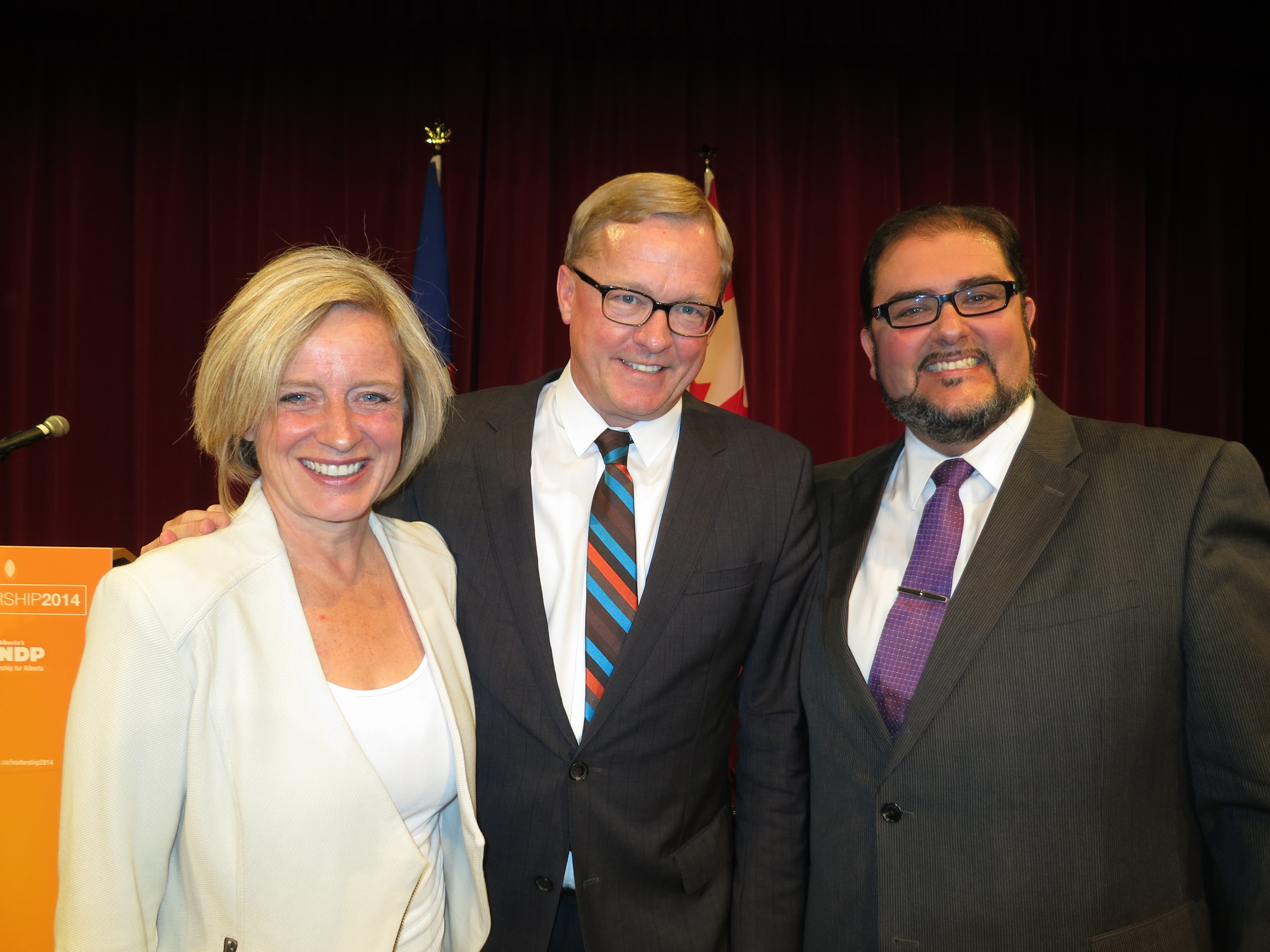Listening to the Alberta NDP’s final leadership debate Thursday night in Edmonton, one could almost imagine there was total unanimity about everything among the province’s New Democrats.
Indeed, there was complete unanimity among the three candidates — in alphabetical order, Edmonton-Calder MLA David Eggen, University of Alberta staff union leader Rod Loyola and Edmonton-Strathcona MLA Rachel Notley — on the stage at the Campus St. Jean theatre.
They got it right more often than they got it wrong, I’m pleased to report, but even when they were wrong, they were all wrong together. They cheerfully all pledged to work hard for whoever wins the vote to replace retiring party Leader Brian Mason on Oct. 18 and 19.
Journalists covering the debate — which involved almost no debating — had to work hard to come up with a way to frame their stories amid all this concord. The Edmonton Journal’s reporter emphasized the ebullience of the crowd of 200 or so hardy Prairie social democrats at news of recent public opinion polls that show the party doing well in the Edmonton area and in Lethbridge. The CBC’s reporter focused on the candidates’ entirely predictable attacks on Alberta’s right-wing government and its even-more-right-wing opposition party. The editor of a subscription-only legislative newsletter mocked the apparent harmonic convergence within the party.
But everyone — candidates, supporters and journalists alike — ignored the elephant in the room, the serious and continuing division within the party itself, and perhaps more importantly among the broader group of progressive voters in Alberta who are leaning toward supporting it on election day, about the pros and cons of working with other progressive parties with similar platforms like the Alberta Liberals, the Alberta Party and the Greens.
If a question was asked about this, I didn’t hear it. If it came up at one of the other debates I didn’t attend, I missed the discussion that followed.
But without taking a position on whether some form of progressive co-operation is a good idea, let alone even possible, if you don’t think this is a burning issue among significant numbers of progressive voters, all you need to do is scan through the comments on the most recent Alberta Diary post to get a sense of the principal arguments, and the passion, of this very real debate that is happening whether or not the parties’ leaders are interested.
And, while it’s pretty obvious the NDP’s leadership isn’t interested, it’s a pity the issue didn’t get an airing in this campaign — which would have both been more interesting from a journalistic perspective and fostered a worthwhile discussion among the broader community of progressive voters in Alberta.
It’s not just New Democrats, of course, who need to talk about this, but Alberta Liberals, Alberta Party members and Greens as well. But it is likely the NDP would have benefitted most from a frank and public discussion of the need, somehow, to bring progressive voters a little closer together.
Regardless, there was no way this necessary discussion was going to happen at the natural time for it to happen — during a leadership campaign by one of the principal players — if there was no candidate willing or able to speak for it, or at least address it, as Nathan Cullen did in the 2012 federal NDP leadership campaign.
Cullen’s proposal for “joint nominations” in Conservative-held ridings did not persuade party members at the time, but it remains on the radar for the future and provides the opportunity to discuss strategies, in the absence of co-operation, for bringing more progressives into the NDP tent.
Failure to even have this discussion, it is said here, could result in Premier Jim Prentice pulling off the same stunt Alison Redford managed in 2012 — passing off a doctrinaire market fundamentalist party as the only hope for progressive electors.
Meanwhile, getting back to the east end of Edmonton, if the candidates were right about high school fees (they’d all like to eliminate them), investment in public education (it should increase, they all say), a public role in long-term care to open acute-care beds in hospitals (they all think it should grow) and the economy (it should serve citizens, not the other way around), where were they all wrong?
I’ll tell you where: lower taxes for small business. Where did New Democrats of all people come up with the idea of lowering taxes for any category of business at a time when middle-class citizens increasingly see society’s costs downloaded on them by conservative governments?
For 30 years now, right-wing governments have been very successful at their strategy of destroying the ability of the public sector to deliver services that benefit everyone by cutting taxes and making the restoration of the revenue stream unthinkable. Freeing all parts of the business sector from fair taxes is the goal of this project, which is a key part of the sadly successful neoliberal agenda of privatization and income inequality.
We don’t need our progressive parties to start jumping on this destructive neoliberal bandwagon!
And I’ve got a news bulletin for whoever came up with this brainstorm — which seems to have been adopted by all three candidates — it isn’t going to win you any votes. The people who want it will vote Conservative anyway. Your supporters will be underwhelmed at best.
At least Notley, it must be said, tempered her support for this bad idea by saying that it ought to be accompanied by a reasonable increase in the minimum wage. “We need a minimum wage that pays the rent. Period!”
And Eggen called for a return to some form of rent control to ensure that even a fair minimum wage can do that.
But if other parties with similar platforms aren’t as progressive as the NDP, and co-operation is not on the agenda, maybe the way for the NDP to establish that distinction would be to propose more-progressive policies.
This post also appears on David Climenhaga’s blog, Alberta Diary.



